Not all radios are approved for commercial uses in Canada, and thus cannot be programmed with licensed channels. As a licensed radio equipment supplier and programmer, Expert Mobile Communications is mandated to follow the rules set by Innovation, Science and Economic Development Canada (ISED) formerly called, Industry Canada.
These rules are captured in the Notice to Radio Equipment Suppliers & Radiocommunication Users. Download the ISED notice . Here are the key points from the notice:
- Unless specifically exempted, every two-way radio requires a radio licence (authorization) from ISED.
- Amateur, marine and user programmable radios are NOT permitted for land mobile use in Canada and may be subject to seizure.
- Installation of Police, Fire, Ambulance or other frequencies without permission is forbidden, even if the frequencies are installed as receive only. All frequencies programmed into your radio must be listed on your radio licence.
- The authorized “Area of Operation” for each frequency is stated on your radio licence or appendix text. Operation outside of the “Area of Operation” is a violation of the Radiocommunication Act and can cause interference which endangers lives.
In simpler words, only two way radios that have been authorized by ISED can be programmed. So by default, and in accordance with the rules set by ISED, all amateur, marine and user programmable radios cannot be programmed for commercial uses in Canada. In the same way even if the user has been authorized to use certain frequencies, those frequencies cannot be programmed into radios that have not been approved by ISED.
Failure to obtain the appropriate radio license may result in fines, equipment seizures and imprisonment.
Unauthorized / illegal (self-programmable) two way radios
There are a number of self-programmable radios sold in Canada. They often appear on platforms like Kijiji and Facebook Marketplace, distributed by certain dealers in the province. It's crucial to note that these self-programmable radios are unauthorized for programming (as per ISED regulations). Typically, these radios feature DTMF microphones with numeric keypads, allowing users to directly input VHF frequencies. However, the use of such radios for commercial purposes is considered illegal by ISED, and there are associated penalties for using them in Canada. This is also the reason why we do not carry self-programming radios in our inventory.
According to ISED: Amateur, marine and user programmable radios are NOT permitted for land mobile use in Canada and may be subject to seizure.
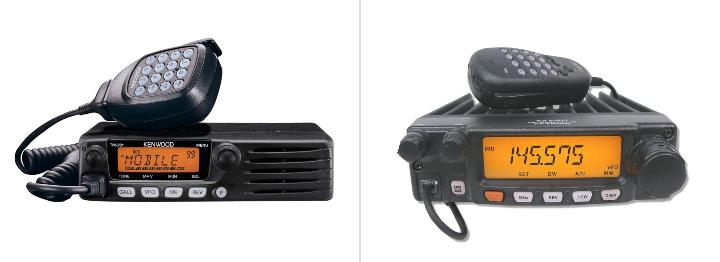
Several radios, such as the Kenwood TM-281a (left) and the Yaesu FT-2900 (right) display an Industry Canada certification label. You may have heard that having this label makes them legally usable in Canada. However, what may not be explicitly communicated is that their legality is confined to Amateur Radio operators who have successfully undergone and passed an Industry Canada exam.These radios are also only legal for transmitting between 144-148 MHz. ISED can prosecute individuals who use these type of radios on commercial bands.
Identifying programmable radios approved by ISED
As certain manufacturers design radios for both commercial and amateur radio purposes, distinguishing between them can pose a challenge. Recognizing two-way radios approved for programming requires a careful examination of their specifications, features, and compatibility with programming software. The following steps can assist in identifying radios suitable for programming:
Non-approved radios | Approved radios |
| Non-approved radios often have 100 or 200 channels | Commercially approved radios usually have 16, 32, 64, 128, 256, 500, 512, 1000 or 1024 channels. |
| Radios with 65W, 75W or more are not approved for commercial use, including: on the logging/oilfield roads | Commercially approved radios transmit at 30W or 50W. |
Also, if you find a radio model listed as an Amateur Radio or featured on a HAM radio site, it is likely not approved.
Always ensure that the two-way radios comply with ISED's regulations and licensing requirements. If in doubt, contact the manufacturer's support. As a licensed radio equipment supplier and programmer, Expert Mobile Communications offers assistance in choosing radios suitable for programming.
Industry Canada-Approved Channels
None of the Western Canada Road Channels (including the Basic 10 LADD and Alberta Open channels and BC Resource Road channels) fall within the channels approved for amateur radio uses (amateur radio channels are ONLY approved to transmit within 144-148 MHz). The vast majority of oilfield / lease road channels are in the 150-174 MHz range. Only ISED approved commercial VHF radios, designed for use in the 136-174 MHz range, are legal as such.
All the new VHF radios we sell are Industry Canada approved for use in the full commercial band. We do not sell modified Amateur Radio equipment for use on the Alberta / BC / Northern Forestry road channels!
Common radios NOT approved for commercial use
Review the list below to identify which radios are illegal to use on commercial frequencies.
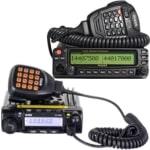
Affordable radio brands commonly found at lower prices
Baofeng; BTECH; HYT; Pofung; QYT; Retevis; Wouxun
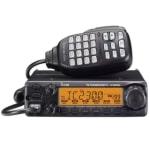
Icom amateur radios
In addition to radios manufactured for commercial use, Icom also makes radios that are approved for Amateur Radio services. Icom amateur radio models do not have the letter "F" in the model number, while the commercial models always have an "F" in the model number. For instance, the IC-2300H shown here is an amateur Icom model.
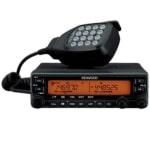
Kenwood amateur radios
Kenwood offers a number of HAM radios that are approved for use on Amateur Radio frequencies only. Some people perform modifications on the radio that enables it to transmit across the entire VHF range. While it is not illegal to sell, buy, or own such a radio, it is illegal to use it on the commercial VHF band.
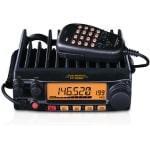
Yaesu amateur radios
Several models of Yaesu transceivers are employed for commercial purposes. Despite bearing an Industry Canada sticker akin to the Kenwood mentioned earlier, they are solely approved for Amateur Radio use. Notably, Yaesu does not manufacture commercial VHF radios.
Always ensure that the two-way radios comply with ISED's regulations and licensing requirements. If in doubt, contact the manufacturer's support. As a licensed radio equipment supplier and programmer, Expert Mobile Communications offers assistance in choosing radios suitable for programming.